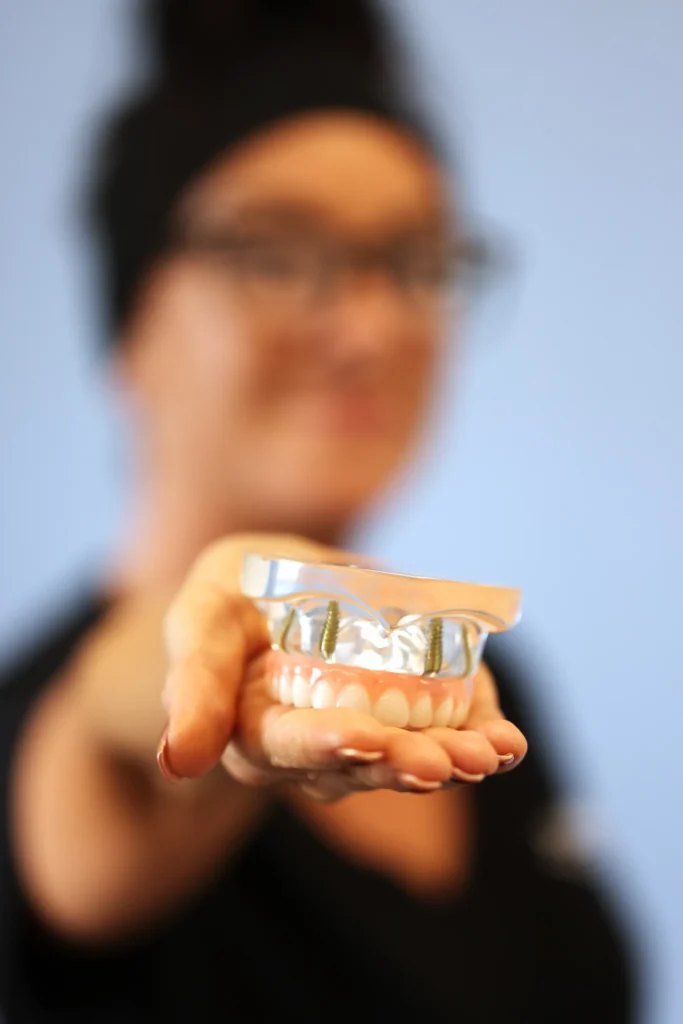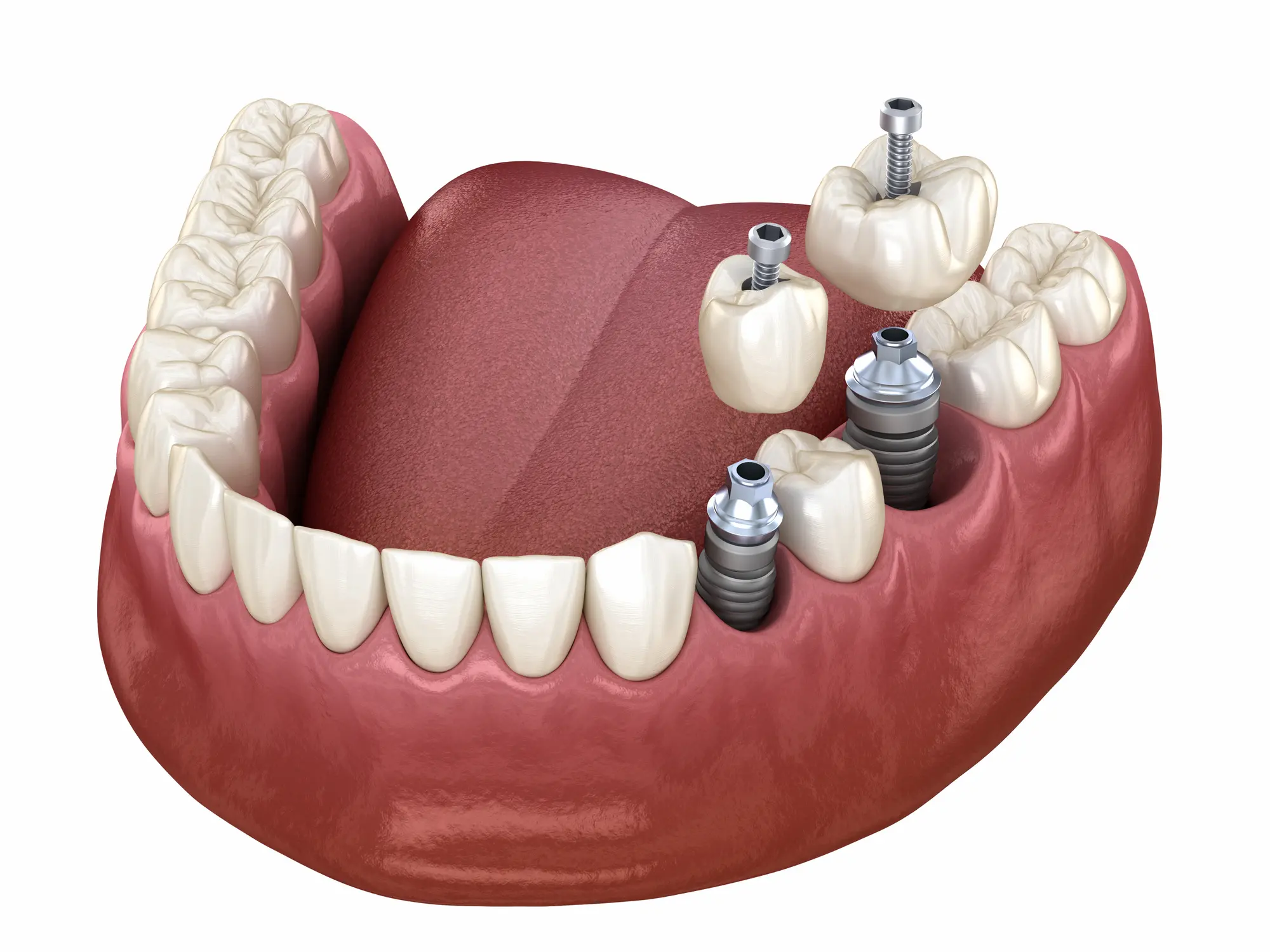Denture implants offer a reliable solution for missing teeth. They are more stable and comfortable than traditional dentures, so you can eat, speak, and smile with confidence.
Denture implants can improve your quality of life by providing a permanent and natural-looking option. According to the American College of Prosthodontists, about 36 million Americans are missing all their teeth in one or both jaws and 90% of those use dentures. So, if you are missing teeth, afraid to smile, and feeling discouraged- you are not alone! Fortunately, advances in dental treatment technology means you can get your radiant, confident smile back.
Let’s discuss the different types of denture implants, their benefits, and which type might be right for you.
What are Denture Implants?
Denture implants are a type of dental restoration designed to replace missing teeth with a more permanent solution than traditional dentures. Dental implants are metal posts that are surgically placed into your jawbone, and these posts act like roots for new teeth.
With denture implants, the new teeth attach securely to these metal posts, giving you stability and comfort. You won’t have to worry about your dentures slipping or shifting in your mouth. Denture implants can help you eat, talk, and smile with more confidence.
These implants also help maintain the structure of your jawbone. When you lose teeth, your jawbone can start to shrink over time. Implants stimulate the bone, helping to keep it strong and healthy. This can prevent changes in your facial shape that can happen with tooth loss.
Types of Denture Implants
Let’s discuss the different types of denture implants available.
Implant-Supported Dentures
Implant-supported dentures use dental implants for support. These dentures snap onto the implants, which are placed in your jawbone. They are stable and do not shift in your mouth. You can remove them for cleaning. They feel more like natural teeth and help you chew better.
All-on-4 Implants
All-on-4 implants use four implants to support a full arch of teeth. This method requires fewer implants and can often be done in one day. It is a good option if you need to replace all your upper or lower teeth. All-on-4 implants provide a strong and stable set of teeth that look and feel natural.
Overdentures
Overdentures rest on top of your gums but are held in place by implants. They can be removed easily for cleaning. Overdentures are more stable than traditional dentures. They help prevent bone loss and improve your ability to chew and speak.
Bar-Retained Dentures
Bar-retained dentures use a thin metal bar attached to implants in your jawbone. The denture clips onto the bar, providing extra stability. This type of denture does not move around in your mouth. It can be removed for cleaning.
Ball-Retained Dentures
Ball-retained dentures, also known as stud-attachment dentures, use ball-shaped connectors on implants. These connectors fit into sockets on the denture, creating a secure fit and preventing the denture from slipping. The denture can be removed for cleaning.
Each type of denture implant has its benefits. You don’t have to choose yourself. We will help you decide which option is best based on your needs and preferences.
Choosing the Right Type of Denture Implant
Choosing the right denture implant depends on several factors.
- Consider your bone density. If you have strong, healthy bones, you may have more options. If your bone density is low, certain types, like All-on-4 implants, might be better for you.
- Think about your budget. Different types of denture implants come with different costs. Some options may require more implants or additional procedures, which can increase the overall expense.
- Consider your lifestyle. If you want a more permanent solution, implant-supported or All-on-4 dentures could be ideal. If you prefer something removable for easy cleaning, overdentures or bar-retained dentures might be a better fit.
When you come in for your complimentary consultation with us at NuSet, we will provide personalized advice based on your specific needs and oral health. We will also use advanced imaging to determine the best type of denture implant for you.
Procedure and Recovery for Denture Implants

The procedure for getting denture implants involves several steps. First, we will evaluate your mouth and take images to plan the treatment. This helps determine the best placement for the implants.
Next, your dentist will surgically place the implants into your jawbone. This is usually done under IV sedation so you won’t feel pain. After the implants are placed, your jawbone needs time to heal and fuse with them. This healing process can take 3-6 months.
Once the implants are securely fused, your dentist will attach abutments. Abutments are small connectors that hold the dentures in place. After the gums heal around the abutments, your dentures will be attached.
Recovery from the implant procedure involves some discomfort, which is normal. We will provide instructions on how to care for your mouth and manage any pain.
Cost of Denture Implants
The cost of denture implants varies based on several factors. The type of implant you choose can affect the overall price. For example, All-on-4 implants cost more than overdentures due to the number of implants needed. The current cost for this at our dental clinic is $17,500-$25,000.
Snap-on-dentures and implant dentures cost $10,000.
The number of implants required also impacts the cost. More implants usually mean a higher price. Your dentist will discuss the number needed for your specific case.
Additional procedures, such as dental bone grafting, can increase the total cost. For example, if you need bone grafting to strengthen your jawbone, this will add to the expense.
We understand getting implants can be a huge investment. This is why we offer dental insurance and financing option plans to help manage the expenses.
Consult NuSet Dental Implants and Oral Surgery for Your Denture Implants
Denture implants offer a stable and lasting solution for missing teeth. They can improve your ability to eat, speak, and smile with confidence. At NuSet, we provide various types of denture implants, each with unique benefits tailored to your needs.
Choosing the right type depends on factors like bone density, budget, and lifestyle. Our expert team will help you find the best option for you.
The cost of denture implants varies depending on the type, and we offer flexible payment plans and work with insurance companies to help manage expenses.
Trust us to improve your quality of life with our expert care. We provide natural-looking and comfortable solutions for missing teeth. Contact us now to learn more and take the first step toward a confident smile.
Frequently Asked Questions
Which type of tooth implant is best?
The best type of tooth implant depends on your individual needs. Factors like bone density, the number of missing teeth, and your budget play a role. Common options include implant-supported dentures, All-on-4 implants, and overdentures. Consult with us at NuSet to determine the best choice for you.
What are the different types of implant overdentures?
There are two main types of implant overdentures: bar-retained and ball-retained. Bar-retained overdentures use a thin metal bar attached to implants in your jawbone. The denture clips onto this bar. Ball-retained overdentures use ball-shaped connectors on the implants that fit into sockets on the denture.
Which type of implant is most commonly used?
Implant-supported dentures and All-on-4 implants are among the most commonly used types of implants. They offer stability, comfort, and a natural appearance. These implants are suitable for many patients and provide excellent long-term results.
What is the healthiest dental implant?
All dental implants are designed to be healthy and biocompatible. The healthiest option depends on individual factors such as your oral health and bone density. Titanium implants are widely used due to their strength and compatibility with the body. Zirconia implants are an alternative for those with metal sensitivities. We will recommend the best option for your health needs.





